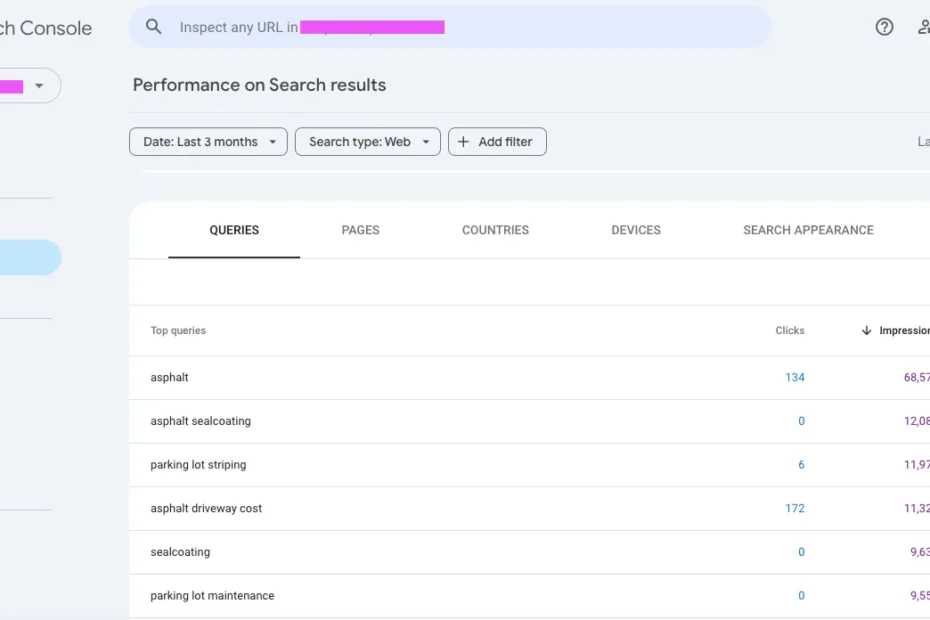Originally published on our Medium
Whenever we get content strategy clients with established (read: old and unorganized) websites, the first thing we do for them is run a Google Search Console audit.
Google Search Console is a tool that reports on all aspects of your site’s health — sitemaps, indexation issues, links to your site — and much more. This tool is free and easy to use.
Most GSC SEO audits focus on technical stuff like load speed and indexation, but we’ve built a process that’s amazingly effective for content strategy research.
Namely, we’re looking at the impressions your site gets deep in Google’s results, the queries that get you the impressions, and the pages picking them up.
You have to use the search engine performance report that looks like this:

What you get from Google Search Console content audits
There are several major benefits of running a GSC data audit as early as possible. Especially if the website has 20+ pages and has been live and indexed for a while.
First-hand data
Google Search Console content audits give you a chance to get accurate data on search queries as they happen in real time.
Most third-party keyword tools get their data from Google with a several months’ delay, but GSC will show you all the keyword combinations and the impressions they get you here and now.
You also see the true search volume of keywords and know what to expect if you decide to push them further.
If you got 100 impressions in 7 days for a query that you’re ranking on page 1 for — you can safely assume the query gets around 400 searches per month. If you got 500 impressions for a query that you’re on page 7 for — you know there’s a high traffic opportunity there.
A chance to make old content work
GSC audits let you identify old content with the most potential.
You can get re-optimize old posts and pages based on the impressions data before you invest into new content production.
Update your old pages with extra text that includes real searches your audience uses, and these pages will grow in organic traffic.
This is great because you can make effective data-driven on-page SEO changes fast and have them kick in before spending more.
Ultra-relevant content ideas
Each time you run a GSC audit you see unexpected search phrases that you’re not specifically targeting in your content— but they still get you impressions deep in SERPs.
When you are getting impressions for phrases you’re not actively using, it’s a clear indication that producing dedicated content for these searches will very likely put you higher in search results.
Some of these searches “deserve” their own landing pages — and they usually make a great addition to your content plan!
What happens is Google already considers you somewhat of a niche authority and “tests” your site with some deep impressions for related queries. Take their advice and turn the search queries that make sense into new blog posts.
Your target audience is already interested in these topics, and your site already seems like a nice match to Google, so funnel that interest to your products and services!
New blog posts that you come up with using GSC audits have a much higher success rate, and that means there’s less guesswork in content production.
Here’s an example from our recent work. This medical device manufacturer website is getting 80 impressions per month on page 10 of Google results for the query “medical practice software australia”:

…and at the same time the only page picking up that phrase is NOT a tightly optimized one. It’s covering a similar topic that has a totally different angle:

We will advise the client to produce a general blog post listing all available medical practice software products for Australian healthcare businesses since there is a clear interest in comparing them. They will have a chance to plug their product high up the list, since it offers a lot of features relevant to this market.
To find such opportunities on Goole Search Console, look for search queries that are getting you relatively high impressions, then switch to the “pages” tab and see what page of your site is picking up these impressions.
If it’s not a dedicated page centered specifically around this topic, chances are, the search volume is enough to create a new page/post for it.
Of course you need to evaluate each search phrase individually but that’s the best start you can get (or get us to do it for you).
Better understanding of the target market
Google Search Console data will show you the true interests of your target audience, since you are able to see what they search for in relation to your website’s content.
Here’s an example — below is a set of the top queries that an online grill store is getting impressions for. We have filtered it to 1-day impressions and page 6 of Google results and deeper:

You can tell there is a considerable interest for outdoor kitchens — and knowing that you can see if you can expand the client’s content pool covering that topic.
This data is useful not only because it helps you with your SEO activities, but with business development as well.
If your old content is detailed and well-written (another reason to stay away from generic AI articles), you will be able to harvest ideas for emerging business opportunities and niches.
Do this often to stay ahead of the competition
We recommend running a GSC audit at least twice a year for active and large sites.
If you want to chat and see if you need this done — get in touch!
